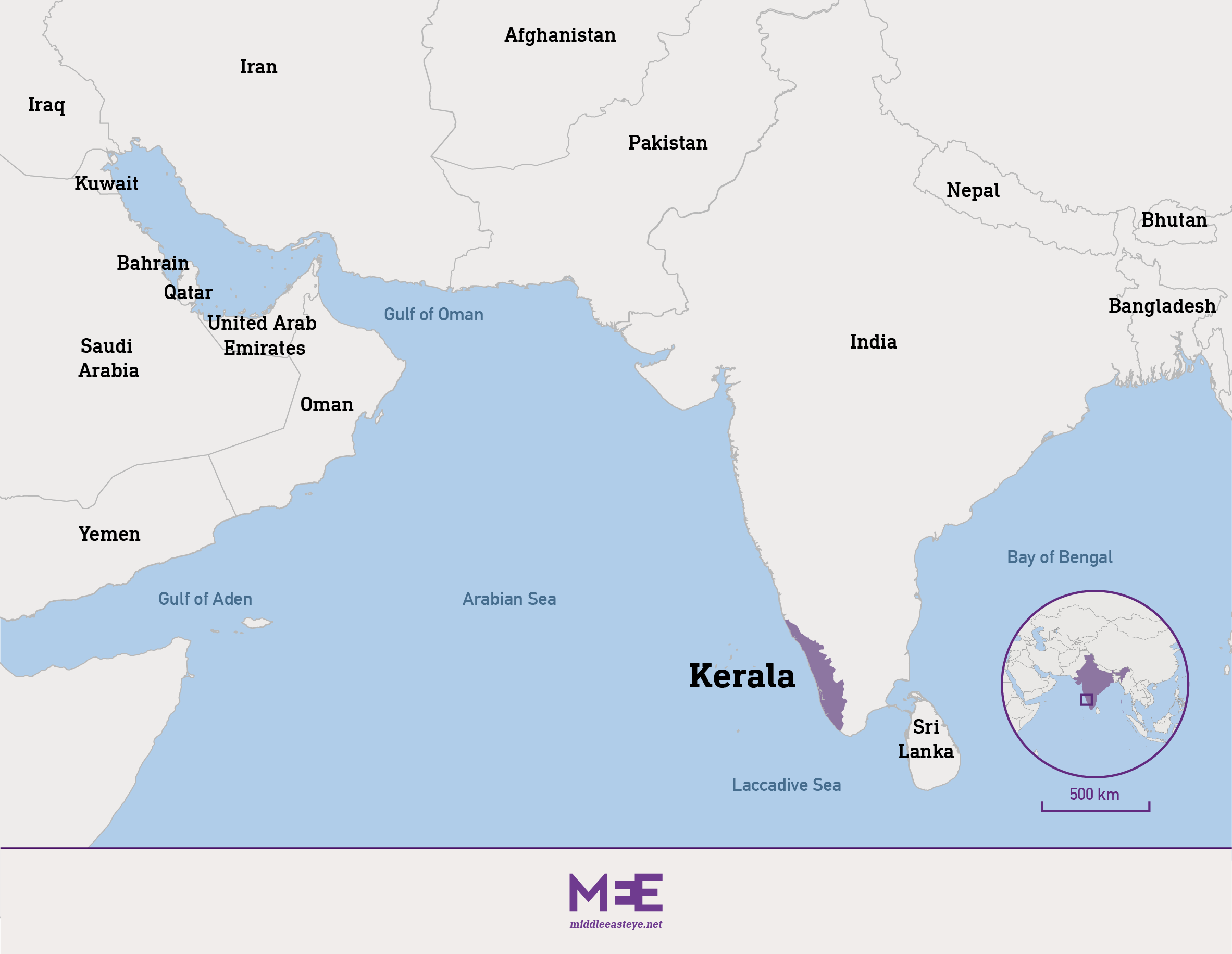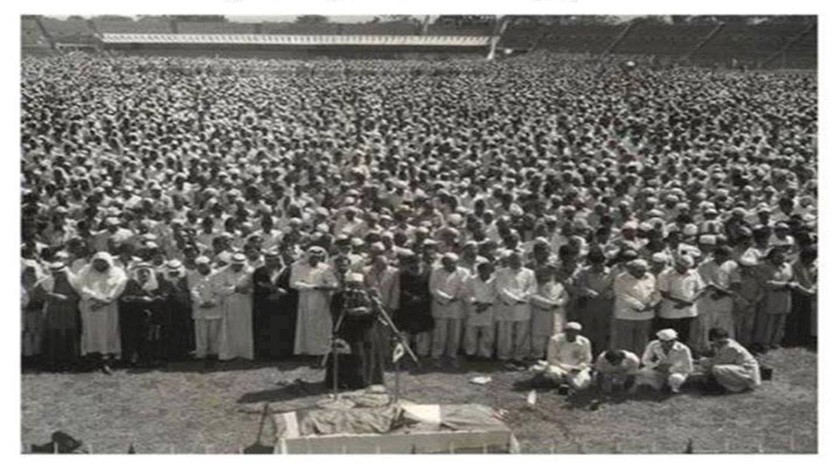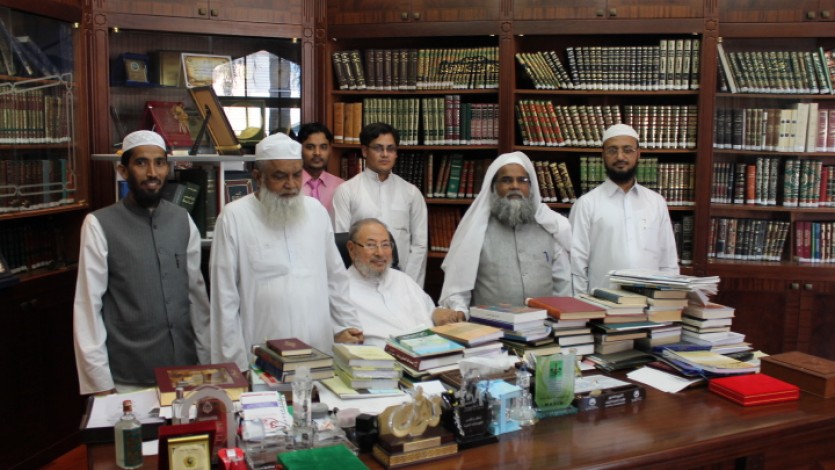When Abul A’la al-Maududi, the most prominent Islamic figure in the Indian subcontinent died in 1979, it was the late Egyptian scholar and cleric Yusuf Qaradawi who led his funeral prayer, attended by thousands.
Photos of the prayer were shared widely on social media after the death of Qaradawi on Monday in Doha at the age of 96. The fact that Qaradawi led the prayer for Maududi was seen as highly symbolic of his influence and status among Islamic intellectuals, transcending the boundaries of his country of birth, Egypt, and his place of residence in the Gulf state of Qatar.
Middle East Eye spoke to some of Qaradawi’s students and followers in the south Indian state of Kerala, where thousands have been deeply influenced by his thoughts on Islamic jurisprudence, and where more than a dozen of his works were translated into Malayalam, the local language.
“I don’t remember any other contemporary Arab scholar as influential as him in Kerala,” said Ilyas Moulavi, a former assistant and student of Qaradawi between 1994-1999.
In the early 1970s, many students from Kerala came to Qatar on a government scholarship and enrolled in Al Ma’had al-Dini (The Religious Institute), a high school for boys headed by Qaradawi at the time.
In 1983, Islamic Publishing House, the publication wing of the Kerala state unit of Jamaat-e-Islami Hind (JIH), published the translation of Qaradawi’s book The Lawful and the Prohibited in Islam, said Kottathodika Hussain, the current assistant director at the publishing house.
Later IPH published over 15 books by Qaradawi, which included two volumes of his four-volume Contemporary Fatwas, he added.
Hussain said IPH didn’t publish the translation of Fiqh Al-Zakat (The Jurisprudence of Zakat), Qaradawi’s expanded doctoral thesis, but all the subsequent IPH publications on the topic heavily drew from the book.
A scholar of ‘moderation’
Not all of his supporters in Kerala were subscribers to the ideology of the Muslim Brotherhood, the Egyptian political Islamic movement which inspired Qaradawi’s early life and activism and which now considers him one of its main ideologues. He was respected by intellectuals from across the Islamic spectrum.
Social scientist Sadik Mampad said the rhetoric of Islamic revivalism and islah (reform) existed in Kerala long before Qaradawi.
“Kerala’s Islamic revivalist movement, a section of which later aligned with Salafism, has been influenced by the thoughts of Rashid Rida, Muhammad Abduh, and the Egyptian revivalist magazine Al-Manar since the 1920s,” Mampad told MEE. “So when Qaradawi came, he was understood and accepted.”
“He did, however, bring the concept of wasaṭiyya [moderation] to the fore of Islamic movements,” Mampad said.
Mampad said that Qaradawi was among the first to use the internet to disseminate his ideas, including by issuing fatwas through the English-language website Islamonline.
“He used contemporary language to disseminate his thoughts. Many Islamic scholars, who otherwise interpreted fiqh liberally, were still strict about music and movies. But Qaradawi had fatwas in favour of creative arts and entertainment,” Mampad said.
Though his Fiqh al-Aqalliyyat (Jurisprudence of Minorities) was originally meant for European Muslims, Indian Muslims too found it relevant, Mampad said.
“Some Islamic jurisprudence councils in India considered Qaradawi as a reference point. He also taught Islamists how to be involved in the democratic process and asked them to speak in the language of citizenship,” he said.
Likewise, Faiz Babu, a social activist in Kerala, said that “Qaradawi viewed jurisprudence as a problem-solving tool rather than the baggage of tradition”.
While most of his Indian students hailed from Kerala, MEE spoke to an Indian scholar known for studying Qaradawi’s life and works who came from farther north.
Masood Alam Falahi, from the Uttar Pradesh state, lived in Qatar from 2007-2009 and wrote multiple books on him, alongside a PhD dissertation on Qaradawi’s works.
Falahi’s works cover Qaradawi’s thoughts, jurisprudence and literature, especially on the jurisprudence of minorities (fiqh al-aqalliyyat) and the jurisprudence of priorities (fiqh al-awlawiyyat).
“His approach was moderation,” he said. “He was against fanaticism and extremism, religious or sectarian, in thought, jurisprudence, and behaviour.
“His books Fiqh al Lahw w al-Tarweeh (Jurisprudence of Entertainment and Recreation) and Fiqh al Ghena w al-Mausiqi (Jurisprudence of Singing and Music) seek a middle path between excess and negligence. He wanted to make issues easy for Muslims.”
As for Qaradawi’s influence in India, Falahi said he had close contact with all Islamic groups. “He visited Darul Uloom Nadwatul Ulama in Lucknow, Jamiatul Falah and Darul Musannefin Shibli Academy in Azamgarh, and Jamia Nizamia in Hyderabad.” These institutions broadly represent Salafi, Sufi and Islamist ideologies.
When Qaradawi left Egypt in 1961, he was based in the Gulf region, predominated by the Hanbali school, which is rigidly textual. “Still, he did not provoke them,” said Sadic K Mohamed, another former student at the Doha-based Religious Institute.
“Qaradawi was gentle in dealing with the Hanbali hardliners. He debated with them with respect.”
Beyond the Islamist circle
Qaradawi’s acceptance in India crossed the boundaries of Islamism and JIH.
“He respected Indian scholar Abul Hasan Ali Hasani Nadwi very much, stayed for days in Darul Uloom Nadwatul Ulama, an Islamic seminary in Lucknow in northern India, and lectured there,” said Moulavi.
“Nadwis were staunch opponents of JIH and Islamism, but still they loved him very much because of his Fiqh al Taysir, whose motto was ‘simplify and do not complicate it’.”
Qaradawi’s works were also praised by progressive Muslim scholars, said Arif Zain, principal of Sullamussalam Arabic College in Malappuram.
“My father, AP Abdul Qader Maulavi, frequently consulted Fiqh al-Zakat, saying that Qaradawi beautifully analysed and organised everything scattered across different traditions related to Islam’s obligatory donation in one volume.”
Zain and his late father have always disagreed with Qaradawi’s political views.
Ashraf Kadakkal, head of the Department of Islamic and West Asian Studies at the University of Kerala, pointed out that Qaradawi was not liked by those on the far right or far left.
“While studying at Al-Azhar, I came across a man from Chad who hated Qaradawi for permitting shorter beards and handshakes between male and female strangers. On the other end of the spectrum, the secularists demonise him for his political views. The fact remains that he believed in democratic values.”
Post Disclaimer
Disclaimer: Yusuf Qaradawi and Islam: How the late Egyptian scholar is remembered in India - Views expressed by writers in this section are their own and do not necessarily reflect Latheefarook.com point-of-view


